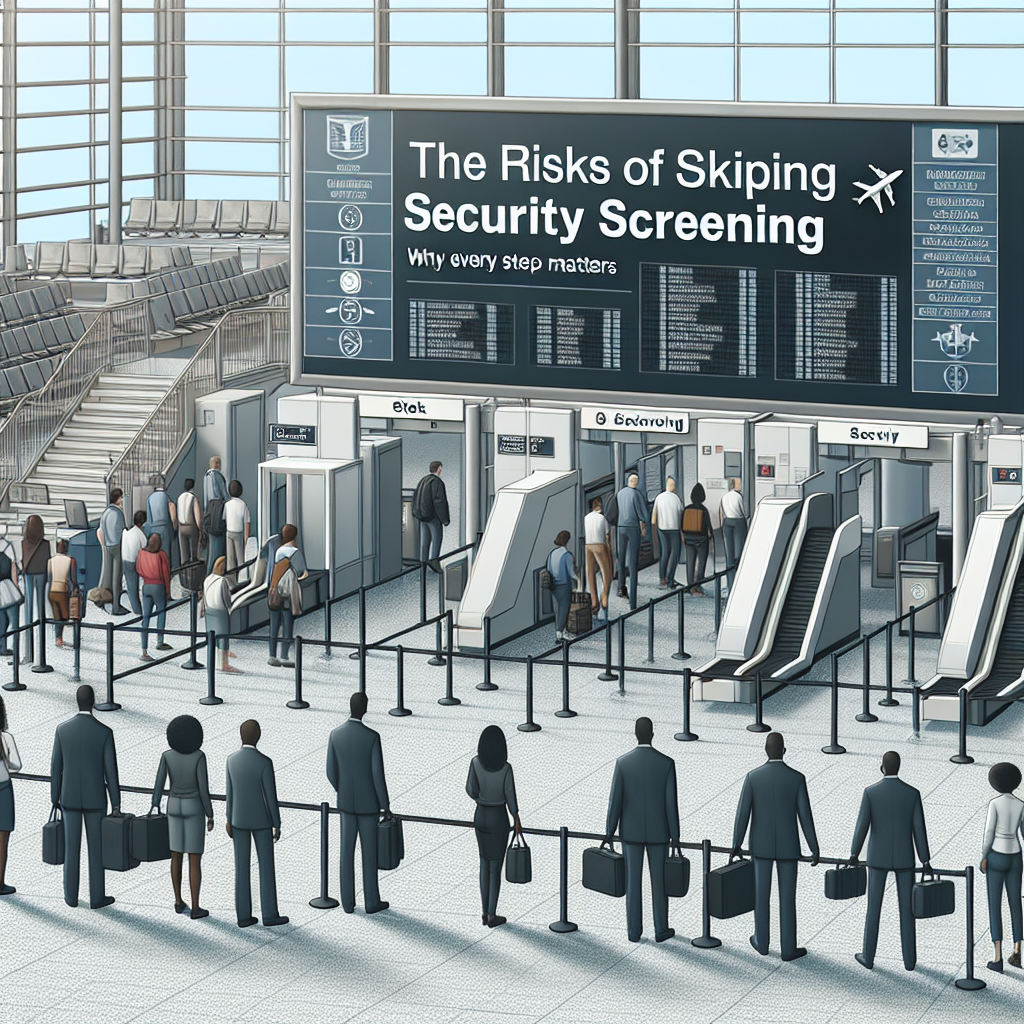
Introduction
In today’s fast-paced world, the temptation to cut corners is ever-present. Whether in business, travel, or daily routines, many consider skipping a few steps as a harmless way to save time. However, this mindset can have dangerous consequences, especially when it comes to security screening. The Risks of Skipping Security Screening: Why Every Step Matters isn’t just a catchy phrase; it’s a crucial mantra in safeguarding lives and assets.
Imagine arriving at an airport, only to bypass security checks because you’re running late. Or think about skipping a security audit for your business in hopes of saving a few bucks. Such choices could lead to catastrophic outcomes, making it essential to understand that every step in security protocols plays a pivotal role in ensuring safety. This article dives deep into the myriad risks associated with skipping security screening, using real-world case studies, statistical insights, and practical advice to underscore why every step truly matters.
Understanding Security Screening: What Is It?
Definition and Purpose
Security screening refers to the process of inspecting individuals, luggage, or cargo to identify and mitigate potential security threats. Its purpose is to ensure safety and protect against illicit activities, such as terrorism, theft, and fraud. By implementing meticulous security protocols, organizations can build trust and provide a safe environment for customers and employees alike.
Different Contexts for Security Screening
Air Travel: Airports implement rigorous security measures to check passengers and luggage before boarding flights.
Corporate Security: Businesses often conduct screenings for employees and visitors to prevent data breaches and workplace violence.
- Public Events: Large gatherings like concerts or sporting events employ security screenings to deter potential threats.
The Risks of Skipping Security Screening
Increased Vulnerability to Threats
One of the most glaring risks of skipping security screening is heightened vulnerability. In recent years, there have been numerous high-profile incidents where lapses in security led to disastrous consequences. For example, the 2017 Manchester Arena bombing was a tragic reminder of the importance of thorough event security protocols.
Case Study: Manchester Arena Bombing
On May 22, 2017, a suicide bomber detonated an explosive device at the end of an Ariana Grande concert in Manchester, England, killing 22 people and injuring hundreds. An investigation revealed that security measures could have been more robust. Had proper screening been implemented, the likelihood of the attack could have been significantly reduced, emphasizing that The Risks of Skipping Security Screening: Why Every Step Matters is not just theoretical but could save lives.
Financial Implications
Skipping essential security checks can lead to significant financial repercussions. The cost of damage incurred from incidents tends to far exceed the expenses associated with proper security measures. For example, a data breach—often facilitated by inadequate security screening—can cost organizations millions in legal fees, restitution, and reputational damage.
Table 1: Financial Impact of Skipping Security Measures
| Type of Incident | Average Cost | Long-term Impact |
|---|---|---|
| Data Breaches | $3.86 million | Loss of trust, decreased customer base |
| Theft/Vandalism | $500,000 | Increased insurance premiums |
| Terrorist Attacks | $10 million+ (varies) | Long-term safety concerns |
Analysis: The table above illustrates the stark difference between the costs of implementing security measures and the financial fallout from neglecting them. It becomes clear that The Risks of Skipping Security Screening: Why Every Step Matters, particularly in protecting financial assets.
Legal Repercussions
Neglecting security protocols can result in legal penalties. Organizations that fail to conduct proper security screenings may face lawsuits or fines. In a legal case involving lax security protocols, the judicial system often assesses whether an organization has taken “reasonable steps” to protect its employees and customers.
Case Study: Target Data Breach
In 2013, Target fell victim to a massive data breach where hackers accessed credit card information from over 40 million customers. Legal actions followed, resulting in Target paying $18.5 million to settle claims from 47 states. This incident highlights The Risks of Skipping Security Screening: Why Every Step Matters, as the company’s failure to implement adequate security measures led to dire financial and reputational consequences.
Damaged Reputation
A compromised security incident can mar an organization’s reputation for years. Consumers are more aware of security issues and may choose competitors over businesses with a history of security failures.
Case Study: Equifax Data Breach
Equifax, one of the largest credit bureaus, faced a severe backlash following a data breach in 2017 that exposed personal information of 147 million people. The company faced not only legal penalties but also lost consumer trust and suffered a significant drop in stock prices. This incident illuminates how The Risks of Skipping Security Screening: Why Every Step Matters in maintaining a reputable brand.
The Psychological Aspect: Trust and Security
Consumer Confidence
Every time a security procedure is skipped, consumer confidence erodes. People are less likely to engage with businesses or systems that lack demonstrated safety. This is particularly evident in industries like travel, where safety ratings significantly affect customer choice.
Airline Trust: Passenger confidence is built on security screening. Incidents of skipped screenings lead to immediate drops in airline ticket sales.
- Retail Security: Shoppers feel safer in well-monitored environments, directly impacting foot traffic and sales revenue.
Employee Morale
A secure environment fosters a sense of safety among employees. Conversely, lack of security can cultivate fear and anxiety, leading to decreased productivity and higher turnover rates. Employees want to feel safe and valued, and comprehensive security measures are a vital part of that equation.
Enhancing Security Screening Processes
Training and Awareness
Regular Training: Staff should undergo continuous training in security protocols, emphasizing the importance of vigilance and adherence to processes.
- Awareness Campaigns: Create programs that inform the public and employees about the significance of security screenings.
Technological Integration
Table 2: Technologies That Enhance Security Screening
| Technology | Purpose | Benefits |
|---|---|---|
| Biometric Scanners | Identify individuals through fingerprints or facial recognition | Increased accuracy & speed |
| AI-Driven Analytics | Analyze security data for trends and anomalies | Early threat detection |
| Automated Screening | Use machines to automatically check luggage | Streamlined process |
Analysis: The table above highlights how technological innovations enhance security screening processes, illustrating that The Risks of Skipping Security Screening: Why Every Step Matters not only for human oversight but also for leveraging technology to improve safety.
Collaborative Approaches
Engaging multiple stakeholders, including government agencies, law enforcement, and private businesses, can lead to more comprehensive security measures. Collaborative security screenings can identify new threats and create a multi-layered security approach that increases safety.
Conclusion
The Risks of Skipping Security Screening: Why Every Step Matters is a lesson every individual and organization should embrace. From safeguarding lives to protecting data, the consequences of neglecting security protocols are far-reaching and can be devastating. It is not merely about compliance or following regulations; it is about prioritizing safety, trust, and resilience in a world rife with potential threats.
Investing in robust security measures pays dividends, enhancing psychological safety and elevating confidence among customers and employees. The time to act is now—fortify your security screening processes, train your teams, and cultivate a culture that places utmost importance on every step of the security screening journey.
FAQs
What happens if I skip security screening at an airport?
Skipping security screening can lead to significant legal consequences, including fines, bans from travel, and risk of boarding a flight with prohibited items.
How can businesses improve their security screening?
Businesses can implement ongoing training programs, employ advanced technologies, and engage in cross-industry collaborations to enhance their security measures.
Why is consumer trust essential in security?
Consumer trust is crucial because it directly influences purchasing decisions. Security lapses can erode this trust and lead to financial losses.
Can technology replace human oversight in security screenings?
While technology can enhance security screening processes, human oversight is crucial for addressing complex situations or anomalies that machines may miss.
What are the legal repercussions of inadequate security screening?
Organizations can face lawsuits, hefty fines, and significant reputational damage if they fail to uphold adequate security measures.
Understanding The Risks of Skipping Security Screening: Why Every Step Matters is vital to foster a safe environment and cultivate trust in our interconnected world. The time to take action is now; your safety, your business’s stability, and your reputation depend on it.















